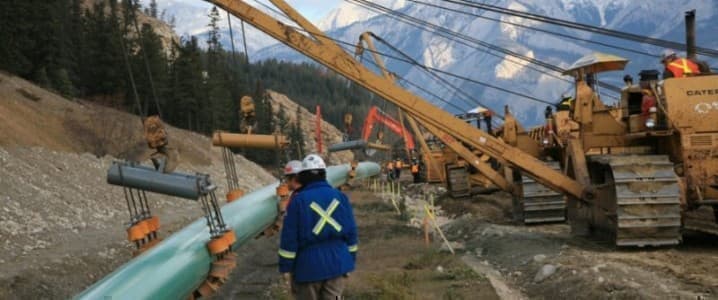The Trans Mountain expansion project has just become the most important oil pipeline project in Canada after U.S. President Joe Biden stopped the U.S.-Canada cross-border link Keystone XL.
The expansion of Trans Mountain, which is set to nearly triple to 890,000 bpd the pipeline capacity from Alberta to the Vancouver coast, is currently expected to come online in December 2022.
With Keystone XL dead, Trans Mountain—a project now owned by the federal government of Canada—is Alberta’s best chance to get its landlocked oil to major markets, including the fast-growing markets in Asia Pacific.
While Alberta is still reeling from President Biden’s decision to revoke Keystone XL’s Presidential permit, analysts and stakeholders see the Trans Mountain oil project as the crucial project that could boost the fortunes of Canada’s oil industry in the medium term.
The renewed attention on Trans Mountain, which Canada’s government bought from Kinder Morgan in 2018, would likely make the completion of the Alberta-British Columbia link more urgent for the federal government, analysts say.
Other experts warn that the Keystone XL demise would embolden protests and opposition to Trans Mountain.
So the Trans Mountain project is now the focus of both the pro-pipeline and anti-pipeline camps in Canada.
The Trans Mountain expansion project is “really the only practical option left for increasing pipeline takeaway capacity and there should be a clear statement from the federal government that they’re committed to its completion,” Dennis McConaghy, a former executive vice-president of Keystone developer TC Energy, told Bloomberg in an interview last week. Related: Oil Majors Poised To Make Biggest Geothermal Investments In 30 Years
The Canadian government doesn’t plan to hold onto its ownership of Trans Mountain and is set to divest it once there are few risks to its completion. Indigenous groups are interested in buying stakes in the project and are holding consultations with the federal government.
“This pipeline is even more valuable now,” Joe Dion, chief executive of Western Indigenous Pipeline Group, one of the First Nations groups that could buy into Trans Mountain, told Reuters.
The killing of Keystone XL could make the business case of the proponents of Trans Mountain stronger.
Trans Mountain has secured committed 20-year contracts of up to 80 percent of the pipeline capacity. Contract utilization and spot utilization are expected at full capacity in the initial years of the pipeline’s operations, Canada’s Parliamentary Budget Officer Yves Giroux said in a report last month.
The report was still considering that Keystone could go ahead, although it acknowledged the possibility of President Biden scrapping the project.
Without Keystone XL, Trans Mountain could receive more commitments for crude oil shipment, analysts say.
“The Government’s decision to acquire, expand, operate, and eventually divest of the Trans Mountain Pipeline System continues to be profitable,” Giroux said in the December report.
In the reference case, the net present value (NPV) of the Trans Mountain system is now US$473 million (C$600 million), the PBO analysis shows. But if the pipeline utilization were to increase by 5.0 percentage points, then the NPV rises to US$709 million (C$900 million).
“However, the profitability of the assets is highly contingent on the climate policy stance of the federal government and on the future utilization rate of the pipeline,” the Parliamentary Budget Officer said.
Right now, the pipeline is profitable with the current climate policy of the federal government, the officer says.
The end of Keystone may not be all bad news for Canada, energy expert Werner Antweiler told Canadian media after reports emerged that President Biden would kill the cross-border pipeline on his first day in office.
“It may be positive news as there’s some competition between these two routes, and if it increases the value of the trans mountain line that’s probably actually not bad news for the federal government,” Antweiler said.
Some analysts question the rationale for Keystone XL, after oil demand collapsed, prices crashed, and Canadian pipelines ended up with more capacity for crude oil than producers were actually shipping.
“If Keystone XL had gone ahead as TC had hoped, there might have been excess pipeline capacity for exports out of Alberta by 2023,” Ed Crooks,
Vice-Chair Americas at Wood Mackenzie, wrote last week.
Yet, even after Keystone’s demise, no one expects Trans Mountain to be smooth sailing. As much as it could become a priority for the federal government to get it completed, the project could end up being the focus of more anti-pipeline campaigns, protests, and lawsuits.
By Tsvetana Paraskova for Oilprice.com
More Top Reads From Oilprice.com:
- Was Saudi Arabia's Surprise Production Cut A Good Idea?
- Goldman Bullish On Oil As It Eyes Major Relief Package
- Can Shale Resist The Lure Of Another Output Surge?


















